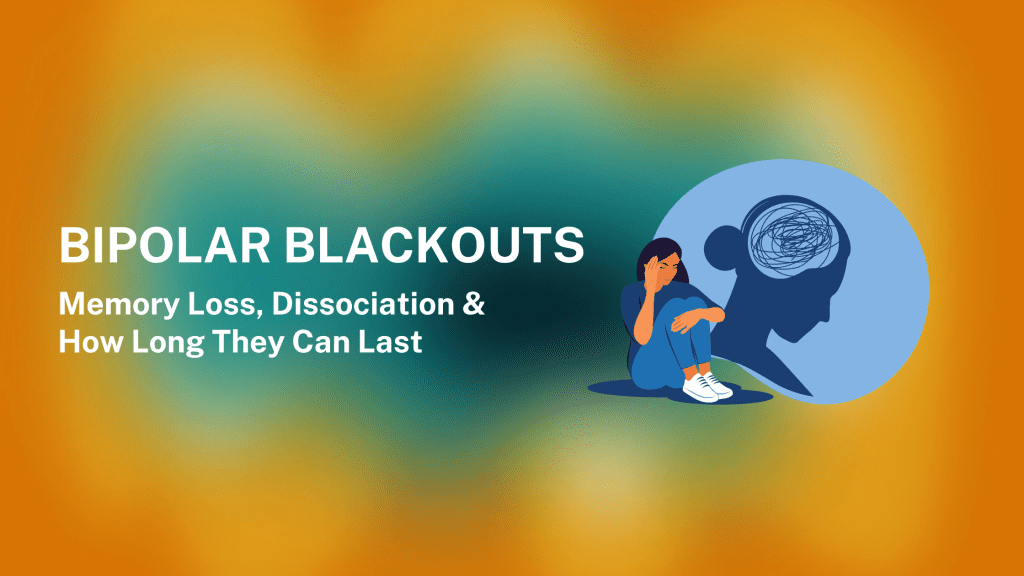Bipolar Blackouts Explained
Memory Loss, Dissociation & How Long They Can Last
Living with bipolar disorder can mean dealing with dramatic ups and downs. For some people, these mood swings go beyond just feeling sad or excited. Memory loss—often called a bipolar blackout—can happen during these episodes, leaving large gaps in a person’s recollection. In this post, we’ll break down what bipolar blackouts are, what causes them, how long they last.
For guidance on how to recover from such extreme symptoms, check out our book and masterclass to reclaim control of your life. You can also check out our free resources.
What Are Bipolar Blackouts?
A bipolar blackout is a period when someone with bipolar disorder loses memory of what happened during a manic, hypomanic, or depressive episode. During these times, people might remain conscious and even interact with others, but later, they may not recall their actions or experiences .
Key symptoms of bipolar blackouts include:
- Gaps in memory: Not being able to recall certain time periods, actions, or events
- Confusion: Feeling unclear about what happened
- Disorientation: Having trouble piecing together what you did or where you were
- Awareness loss: Not recognizing your surroundings or behavior in the moment
Doctors and scientists usually call these symptoms “memory impairment” or “amnesia,” but many people with bipolar disorder use the term “blackout” to describe the feeling of lost time.
What Causes Bipolar Blackouts?
Bipolar blackouts can occur during periods of extreme mood swings, especially mania or severe depression. Causes may include one or more of these occurring at the same time:
- Extreme stress: High stress levels can impact memory and lead to blackouts.
- Manic or depressive episodes: Intense mood changes disrupt how the brain stores or retrieves memories.
- Medication: Some psychiatric medications list confusion or memory problems as side effects. Stopping or changing meds suddenly can also trigger these problems.
- Lack of sleep: Mania often prevents people from sleeping, which worsens memory loss.
- Dissociation: During overwhelming emotional states, people may feel detached from reality or themselves, making it difficult to remember what happened later.
How Long Do Bipolar Blackouts Last?
The length of a bipolar blackout can vary a lot from person to person. Often, the blackout covers the same length as the manic or depressive episode itself—sometimes from a few hours to up to seven days:
- Mild blackouts: May cover just a few hours or a stressful day.
- Typical blackouts: Usually last for the entire manic episode, which is often up to 7 days.
- Severe cases: Rarely, memory problems can last for weeks, months, or even longer, especially if the mood episode is very intense or not treated.
Sometimes, pieces of memory may return gradually, or the blackout may leave only confusing fragments, like remembering a single image or sound but not the whole event.
How Common Are Bipolar Blackouts?
Not every person with bipolar disorder will experience blackouts. Studies suggest that around 30% of people with bipolar disorder experience some kind of blackout or major memory loss during their illness. For those who do, these periods can disrupt daily life, put relationships at risk, and make recovery more complicated.
A Personal Account
One of our clients allowed us to anonymously share their personal experience of a bipolar blackout:
Back in my first manic episode when I was in college, I blacked out for a whole month. It’s like I don’t remember anything about going to the hospital, being told I was bipolar, and all the crazy things I did. I remember snippets here and there. My friends tell me I was saying crazy things and was really hyper all the time. I even almost got arrested for how hyper I was behaving out on the streets but my friend explained to the cop what was going on. Honestly don’t remember any of it and it makes me really embarrassed to this day. But, I eventually came out of it with the medication slowing me down but I honestly still can’t remember.
Final Thoughts
Bipolar blackouts are a serious but manageable part of living with bipolar disorder. They can last anywhere from a few hours to several days, sometimes much longer if the mood episode is very severe. With care, support, and the right prevention tools, people can get past these episodes, regain confidence, and rebuild trust in their memories.
If you or someone you care about lives with bipolar disorder and experiences blackouts or memory loss, reach out for help. You are not alone—millions of people have faced this challenge, and with medical care, therapy, and community support, things can get better.



